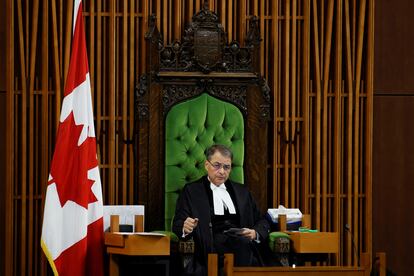Canada’s House Speaker resigns over inviting a man who fought for a Nazi unit to Parliament
After Ukrainian President Volodymyr Zelenskiy spoke to the House of Commons on Friday, Speaker Anthony Rota introduced Yaroslav Hunka as a war hero who fought for the First Ukrainian Division — a group that was under the command of the Nazis

The speaker of Canada’s House of Commons resigned Tuesday for inviting a man who fought for a Nazi military unit during World War II to Parliament to attend a speech by the Ukrainian president.
Just after Ukrainian President Volodymyr Zelenskiy delivered an address in the House of Commons on Friday, Canadian lawmakers gave 98-year-old Yaroslav Hunka a standing ovation when Speaker Anthony Rota drew attention to him. Rota introduced Hunka as a war hero who fought for the First Ukrainian Division.
Observers over the weekend began to publicize the fact that the First Ukrainian Division also was known as the Waffen-SS Galicia Division, or the SS 14th Waffen Division, a voluntary unit that was under the command of the Nazis.
“No one in this House is above any of us. Therefore, I must step down as your speaker,” Rota said in Parliament. “I reiterate my profound regret for my error in recognizing an individual in the House during the joint address to Parliament of President Zelenskiy.”
“That public recognition has caused pain to individuals and communities, including to the Jewish community in Canada and around the world, in addition to Nazi survivors in Poland among other nations. I accept full responsibility for my actions,” he added.
Rota stepped down after meeting with the House of Commons’ party leaders later Tuesday. All main opposition parties called for Rota to step down, and government House leader Karina Gould said that lawmakers had lost confidence in Rota.
“This is something that has brought shame and embarrassment to all of Parliament and indeed all Canadians. The speaker did the honorable thing in resigning,” Government Liberal House leader Karina Gould said.
Gould said she is of Jewish origin and a descendant of a Holocaust survivor. “This incident hurt me personally, as it hurt all members of this House and all Canadians,” she said.
Gould earlier said Rota invited and recognized Hunka without informing the government or the delegation from Ukraine. Canadian Health Minister Mark Holland had called the incident “incredibly embarrassing.”
The Friends of Simon Wiesenthal Center for Holocaust Studies said in a statement that the incident “has left a stain on our country’s venerable legislature with profound implications both in Canada and globally.”
“This incident has compromised all 338 Members of Parliament and has also handed a propaganda victory to Russia, distracting from what was a momentously significant display of unity between Canada and Ukraine. It has also caused great pain to Canada’s Jewish community, Holocaust survivors, veterans and other victims of the Nazi regime.”
In an earlier apology on Sunday, Rota said he alone was responsible for inviting and recognizing Hunka, who is from the district that Rota represents. The speaker’s office said Monday it was Rota’s son who contacted Hunka’s local office to see if it was possible if he could attend Zelenskyy’s speech.
Members of Parliament from all parties rose to applaud Hunka unaware of the details of who he was.
The prime minister’s office said it was unaware that Hunka was invited until after the address. The speaker’s office also confirmed it did not share its invite list with any other party or group. The vetting process for visitors to the gallery is for physical security threats, not reputational threats, the speaker’s office said.
In Moscow, a Kremlin spokesman said it was “outrageous” that Hunka received a standing ovation.
Russian President Vladimir Putin has painted his enemies in Ukraine as “neo-Nazis,” although Zelenskyy is Jewish and lost relatives in the Holocaust.
“It’s highly unfortunate and the only winner here is the Putin regime, which is already spinning what happened on Friday to justify its ongoing military actions in Ukraine,” said Daniel Béland, a political science professor at McGill University in Montreal,
The opposition Conservatives in Canada have blamed Trudeau, but Béland noted that the speaker’s role in Canada is as an officer of Parliament who does not participate in partisan caucus meetings and is not a member of the Cabinet.
Sign up for our weekly newsletter to get more English-language news coverage from EL PAÍS USA Edition
Tu suscripción se está usando en otro dispositivo
¿Quieres añadir otro usuario a tu suscripción?
Si continúas leyendo en este dispositivo, no se podrá leer en el otro.
FlechaTu suscripción se está usando en otro dispositivo y solo puedes acceder a EL PAÍS desde un dispositivo a la vez.
Si quieres compartir tu cuenta, cambia tu suscripción a la modalidad Premium, así podrás añadir otro usuario. Cada uno accederá con su propia cuenta de email, lo que os permitirá personalizar vuestra experiencia en EL PAÍS.
¿Tienes una suscripción de empresa? Accede aquí para contratar más cuentas.
En el caso de no saber quién está usando tu cuenta, te recomendamos cambiar tu contraseña aquí.
Si decides continuar compartiendo tu cuenta, este mensaje se mostrará en tu dispositivo y en el de la otra persona que está usando tu cuenta de forma indefinida, afectando a tu experiencia de lectura. Puedes consultar aquí los términos y condiciones de la suscripción digital.








































